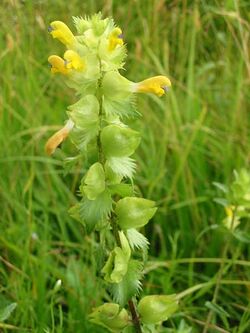Biology:Rhinanthus angustifolius
From HandWiki
Short description: Species of flowering plants in the broomrape family
| Rhinanthus angustifolius | |
|---|---|

| |
| Scientific classification | |
| Kingdom: | Plantae |
| Clade: | Tracheophytes |
| Clade: | Angiosperms |
| Clade: | Eudicots |
| Clade: | Asterids |
| Order: | Lamiales |
| Family: | Orobanchaceae |
| Genus: | Rhinanthus |
| Species: | R. angustifolius
|
| Binomial name | |
| Rhinanthus angustifolius C.C.Gmel.
| |
Rhinanthus angustifolius, the narrow-leaved rattle or greater yellow-rattle, is a plant species of the genus Rhinanthus. It is an annual wildflower native to temperate grasslands in much of Europe, and north and central Western Asia. The yellow flowers are mostly visited by bumblebees.[1]
Distribution
Rhinanthus angustifolius has native distribution in:[2]
- Europe
- Northern Europe: Denmark; Finland ; Norway; Sweden; Estonia; Latvia; Lithuania; United Kingdom, and the northwestern Russian Federation's European Northwestern Federal District oblasts and republics, including Karelia and Saint Petersburg-Leningrad Oblast.
- Middle Europe: Austria; Belgium; Czech Republic; Germany; Hungary; Netherlands; Poland ; Slovakia; Switzerland.
- Southwestern Europe: France
- East Europe: Belarus; Moldova; Ukraine ; and the western Russian Federation's European Central Federal District and Volga Federal District oblasts and republics; including Kirov, Moscow-Moscow Oblast, Smolensk, and Tula
- Southeastern Europe: Bulgaria; Romania; Slovenia, North Macedonia, Croatia, and the other Balkans countries.
- Asia
- Western Asia: Turkey
- Caucasus:
- Transcaucasus: in Armenia; Azerbaijan, and Georgia.
- Ciscaucasia: in the Russian Federation's Eurasian North Caucasian Federal District oblasts and republics; including Chechnya, the Sochi region in Krasnodar Krai, and North Ossetia.
- Pontic–Caspian steppe: western Kazakhstan; the Russian Federation's central-western Asian Southern Federal District oblasts and republics; including Kalmykia Republic and Volgograd.
- West Siberian Plain: the Russian Federation's northwestern Asia region of the western Siberian Federal District; including the Oblasts of Chelyabinsk, Novosibirsk, and Omsk.
Synonyms
- Alectorolophus major Rchb.,
- Alectorolophus glaber (Lam.) Beck
- Alectorolophus montanus (Saut.) Frits
- Rhinanthus apterus (R. angustifolius subsp. grandiflorus)
- Rhinanthus glaber Lam. (R. angustifolius subsp. angustifolius)
- Rhinanthus grandiflorus (Wallr.) Bluff & Fingerh. (R. angustifolius subsp. grandiflorus)
- Rhinanthus major
- Rhinanthus montanus Sauter (R. angustifolius subsp. angustifolius)
- Rhinanthus parviflorus Noulet (R. angustifolius subsp. angustifolius)
- Rhinanthus reichenbachii Bentham in DC. (R. angustifolius subsp. grandiflorus)
- Rhinanthus serotinus (Schönheit) Oborny (R. angustifolius subsp. angustifolius)
- Rhinanthus vernalis (Zinger) Schischk. & Sergueievkaja (R. angustifolius subsp. grandiflorus
- Rhinanthus × poeverleinii (R. angustifolius subsp. ? × glacialis)
Vernacular names
Common names for Rhinanthus angustifolius in various languages include:
- German = Großer Klappertopf
- English = Greater yellow-rattle
- Finnish = Isolaukku
- Dutch = Grote ratelaar
- Macedonian = Голема шумарига
- Polish = Szelężnik większy
- Swedish = Höskallra
- Welsh = Cribell felen fawr
References
- ↑ Van Der Kooi, C. J.; Pen, I.; Staal, M.; Stavenga, D. G.; Elzenga, J. T. M. (2015). "Competition for pollinators and intra-communal spectral dissimilarity of flowers". Plant Biology 18 (1): 56–62. doi:10.1111/plb.12328. PMID 25754608. https://www.researchgate.net/publication/273158762.
- ↑ {{citation | mode = cs1 | title = Rhinanthus angustifolius | work = Germplasm Resources Information Network (GRIN) | url = | publisher = [[Organization:Agricultural Research ServAgricultural Research Service (ARS), United States Department of Agriculture (USDA) | access-date = 16 January 2018 }}
- U.K. Wildflowers - Rhinanthus angustifolius - website page
Wikidata ☰ Q161707 entry

